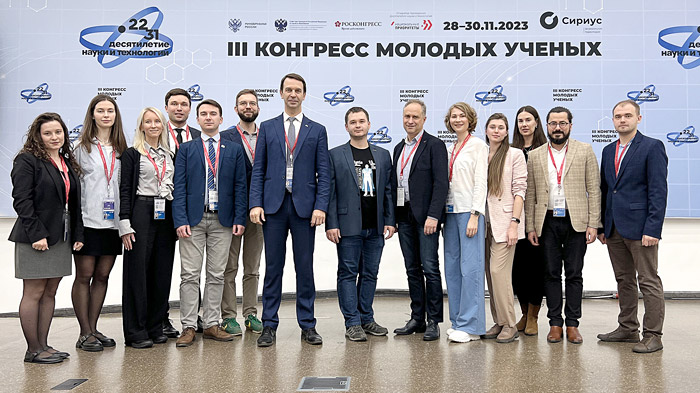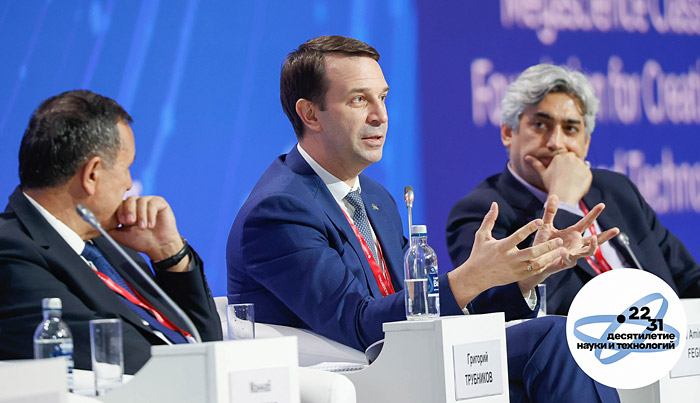
Electronic english version since 2022 |
The newspaper was founded in November 1957
| |
|
Number 46 (4694) |
What was discussed at the Congress in Sochi
On 28-30 November, leaders and young scientists of the Joint Institute took part in the events of the III Congress of Young Scientists in the Sirius Park of Science and Art (Krasnodar Territory, Russia). JINR Director Academician Grigory Trubnikov took part in four sessions of the Congress dedicated to megascience infrastructure in the Russian Federation, the development of science cities in Russia, the role of fundamental scientific research in the scientific and technological development of the country and the role of women in science. Scientific Leader of the Laboratory of Nuclear Reactions Academician Yuri Oganessian answered questions from young scientists in an online broadcast format.
At the Congress, a declaration was signed between JINR and the National Research Centre "Kurchatov Institute" on intentions aimed at joint and full participation in the development and use of megascience class research infrastructure: megaprojects of JINR and the International Centre for Neutron Research based on the PIK high-flux reactor, as well as readiness to develop a joint research programme.

Megascience class infrastructure
At the session "Megascience class infrastructure as the basis for the development of a unified scientific and technological space," the development of a unique network of megascience facilities in Russia was discussed within the framework of the Federal Scientific and Technological Programme for the Development of Synchrotron and Neutron Research.
As Grigory Trubnikov noted, meanwhile, several large mega facilities are currently constructed and developed on the territory of the Russian Federation, such as the PIK reactor in Gatchina, NICA and the Superheavy Element Factory in Dubna, Baikal-GVD, the National Heliogeophysical Complex of the Russian Academy of Sciences, Siberian ring photon source near Novosibirsk and the RIF synchrotron in Vladivostok.

The JINR Director spoke about the fundamental and applied tasks of the NICA accelerator complex, as well as about research in the field of radiobiology, radiation materials science and radiation medicine, in which, as Grigory Trubnikov said, JINR joins efforts with the Ministry of Education and Science of Russia and the Russian Academy of Sciences, FMBA of Russia and the State Corporation Rosatom, NRC KI and numerous foreign centres.
"The high-temperature superconductor technologies developed for the NICA collider are already used by us for energy storage devices. And in the future, they could be used for future scientific facilities: new generation synchrotrons and spectrometers of high-flux reactors," Grigory Trubnikov added.
"Without many institutes, such as BINP SB RAS, NRC KI, Rosatom, we would not have built the accelerator complex. Today, it needs to be exploited and developed together. It is necessary to unite intellectual resources, develop joint user committees for fundamental and applied research, including industry, which also has a request," Grigory Trubnikov stated. He noted that the largest mega facilities on the territory of the Russian Federation attract partner countries and in these conditions, it is necessary to develop joint computer research networks.
President of the Kurchatov Institute Mikhail Kovalchuk announced that a declaration had been signed between JINR and NRC KI. One of the important points of the document will be the joining of JINR as a special partner in the international association PIK - a megascience reactor that is currently constructed at the PNPI NRC KI. JINR's participation in this mega project should be approved by the JINR Committee of Plenipotentiaries at the next session. As Mikhail Kovalchuk explained, members of the PIK association get access not only to the reactor, but also to all the facilities of the Kurchatov Institute - to a complex of synchrotron, neutron and laser research. "Thus, we currently develop a single research space throughout Russia with the inclusion of the CIS countries and other friendly countries," the president of the Research Centre of KI explained.
Development of knowledge-intensive territories
The topic of another session was "New approaches in the development of science cities of the Russian Federation and other territories with high scientific and technological potential."
Grigory Trubnikov emphasized the need to introduce a term at the legislative level that will define what "scientific and technological potential" is. And the regulatory framework itself, what a "science city" is, should be updated. In particular, science cities need mixed administrative and scientific directorate. Citizens of these territories should also participate in shaping their development policies. "In Dubna there is a council of directors of city-forming enterprises, this is 70% of the electorate and 90% of the population. Their opinion is listened to both in matters of infrastructure development and in the development of the administering team of local governments," JINR Director noted. In his opinion, an integrated approach is needed to the development of science cities and knowledge-intensive territories throughout the country; a national programme (including a master plan) is needed for the development of comfortable urban areas and service infrastructure.
Grigory Trubnikov proposed including technological megaprojects in the strategy of scientific and technological development based on science cities, as well as seeking increased government funding to create a comfortable urban environment.
On the role of basic research
Speaking at the topical session "On the role of fundamental scientific research in the scientific and technological development of the country," Grigory Trubnikov highlighted that the issue included in the title of the meeting actually becomes an item on the agenda of all scientific forums held in Russia. JINR Director named three conditions for the development of big science in Russia.
"The scientific community should determine the research area; fundamental research should have the right to take risks and it has to be prescribed by law. The share of basic research in total spending on science should increase threefold: from 0.11% to 0.4%. The third point: we need to think through new formats of consortia and collaborations of institutes in fundamental research that would become a point of attraction for organizations implementing applied research," he laid out.
About women in science
At the event "Women in science: trends and prospects," Grigory Trubnikov spoke about the fact that the Women's Committee has been functioning at JINR for the second year now that includes representatives of all laboratories and administration of the Institute and that very efficiently meets many social issues. And together with the FMBA of Russia, a Women's Health Centre will be developed in Medical Unit No. 9 in Dubna.
According to JINR Director, it would be a blessing if women were extensively involved in setting up a programme for the development of comfortable urban areas, as well as in popularizing science: now in Russia, TV shows and blogs about science are mostly run by men.
Open microphone with Yuri Oganessian
The format of the event "Open microphone" with the participation of Yuri Tsolakovich Oganessian implied a dialogue with the participants and answers to questions from young scientists.
The participants were interested in whether the glorious scientist had any weaknesses (no, he answered, only hobbies), how he had chosen his life's work, how he maintained a balance between work and rest and what he saw as JINR's scientific tasks in a hundred years. The participants learned that being famous is "more of a distraction than a help," how to motivate students toward science and also received a recipe for those that have questioned scientific ideals and are wondering whether to continue in science. Yuri Tsolakovich cited interesting facts from the biography of the inventor of the Periodic Table Dmitry Mendeleev. Academician Oganessian wished the younger generation to be free and brave. "Freedom comes from the society we live in and courage comes from knowledge. I would advise every student to value the time during the period he studies, for he will never have such a situation in life when he is only required to study," Yuri Oganessian said.
When asked what a real scientist should be like, Yuri Oganessian answered: "A scientist should not be a superman. He has to be a curious person that is interested in more than just formulae."
About megagrants
Scientific Secretary of FLNR JINR Alexander Karpov became the speaker of the session "100 million for a major scientific project: reality or dream?" He spoke about the choice of the "Superheavy Element Factory" project for a megagrant within the Institute, about the work on the project, in which, together with JINR, St. Petersburg State University and the Institute of Analytical Instrumentation also took part.
Within the framework of the megagrant from the Ministry of Education and Science won by JINR for 2021-2023, two separators were put into operation and a range of first experiments were implemented. "We saw a multiple improvement in the speed of accumulating statistics compared to the total research results of all laboratories in the world over many years. This is extremely important, because although one event is sometimes enough to discover a new element, to study properties you need to receive tens to thousands of events. At present, we set a goal to reach hundreds of atoms," Alexander Karpov said.
FLNP JINR researcher Alexander Nezvanov took part in the "Scientific Brunch" of leaders of the councils of young scientists and representatives of youth scientific communities. Meetings of the JINR AYSS with representatives of the Councils of Young Scientists of the International Association of Academies of Sciences and the National Academy of Sciences of the Republic of Belarus, as well as with national associations of scientific youth of Kazakhstan and Kyrgyzstan were held.
The JINR delegation at the III Congress of Young Scientists was also represented by Head of the JINR Social Infrastructure Management Office Andrey Tamonov, Chairman of the JINR AYSS Vladislav Rozhkov and young researchers from the JINR Laboratories.
Based on the information from JINR Press Office